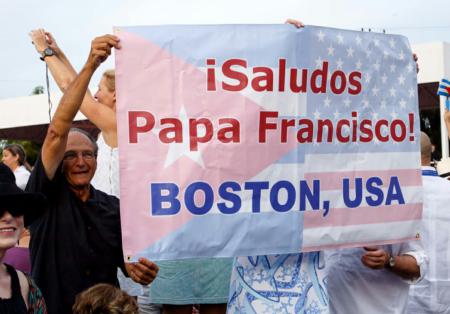Local pilgrims touched by Cuba experience
HAVANA -- Boston pilgrims traveling to Cuba for the visit of Pope Francis spoke with The Pilot, Sept. 20, just after the pontiff celebrated Mass in Revolution Square.
About 85 Boston Pilgrims left with Cardinal Seán P. O'Malley from Logan Airport Sept. 18 and arrived in Cuba in time to attend the Mass celebrated by the pope Sept. 20 in Havana's famous square.
News coverage in the United States noted the symbolic dominance of the square by a large mural of Ernesto "Che" Guevara, a leader in the revolution that turned the island nation into a communist state.
For Boston pilgrims the people of Cuba and those who gathered for the Mass with Pope Francis filled the square as a symbol of the faith of the people of the Catholic Church, present in its universal ministry, as they prepared for the arrival of the Bishop of Rome and to celebrate Mass.
Joseph D'Arrigo, executive director of the Clergy Fund of the Archdiocese of Boston, said the trip gave him a sense of being a part of the Universal Church in stark contrast to the ideology of communism.
"Having gone to Cuba, the Church is much bigger than just Boston. I have gone to many countries, but somehow Cuba and the people of Cuba gave me a greater sense of what the Church is about and our role in the Church," he said.
D'Arrigo said he had more of an emotional reaction to the experience than an intellectual one. He said he saw the Universal Church in the people, not as they participated in the Mass or greeted the pope, but as they anticipated those events in the early-morning darkness -- some having slept in the square overnight.
"In the darkness, here are these Catholics waiting for the pope to say Mass," he said.
D'Arrigo noted a contrast between the illuminated communist figure of Ernesto "Che" Guevara and the figures of gathered Catholics.
"Both of those figures, communism being illuminated over people sleeping on the streets, on the grass, on the concrete, in Revolution Square, waiting to greet the pope and go to Mass, I think that will always stay with me," D'Arrigo said.
Gloria Clough, a parishioner of Holy Family Parish in Concord, said the trip made her feel a common bond as a Catholic Christian with the Cuban people and described their reaction when Pope Francis arrived.
"When he came, they went into a great celebration. These are really very poor people. The poverty really hits you, and we would not know with their celebration, their happiness, at seeing Pope Francis," she said.
She also said the trip gave her the opportunity to understand the involvement Cardinal O'Malley has had with the faithful in Cuba over the years. She said the group toured facilities for the elderly and the disabled as part of the trip.
"It was very, very emotional to see what the Church is doing. We feel very, very proud of the fact that the Church is getting involved in helping these people," she said.
Kathleen Hegenbart, a Boston pilgrim, said seeing the pope on the ground in another country gave her perspective she couldn't have gained by following the news back home.
"It was a once-in-a-lifetime opportunity to experience what it's like to witness the presence of such a great shepherd through the eyes of people who have lived a very different experience than we have," she said.
The pilgrims were to arrive back in Boston on Sept. 22, but Bonnie Rodgers said she believed that the Cuba she saw on the pilgrimage will change with time since the U.S. began to normalize relations with the nation in July.
"It's just very intriguing. This is an interesting time in Cuban/American relations, and it's clear that things will change. So, I wanted to see the Cuba of now," she said.
She said she observed the Cuban perspective on living out the Catholic faith in contrast to her own experience, where Catholic Cubans once faced the suppression of their faith under the atheist regime.
"I have never known what it's like not to be able to practice my religion. There are times I have made it awkward for myself, or maybe even in society it has been less-than-cool at times, but institutionally and in government perspective I have always been free to practice my religion, always," she said.



















